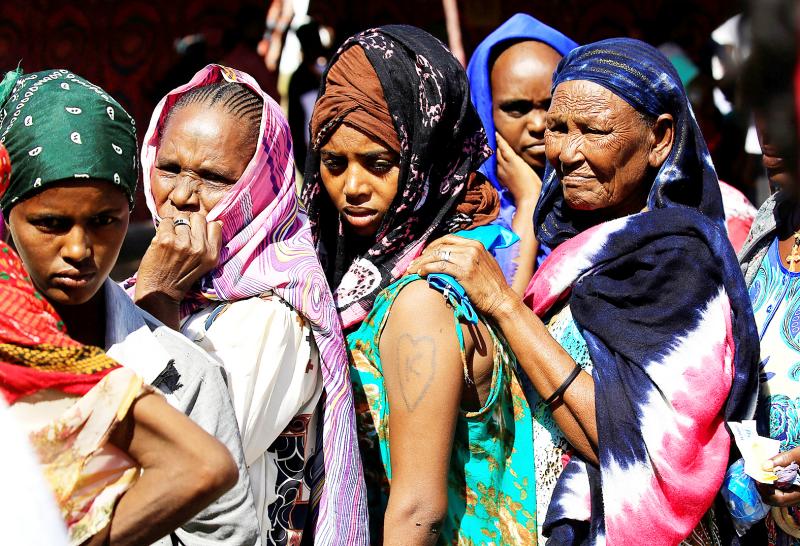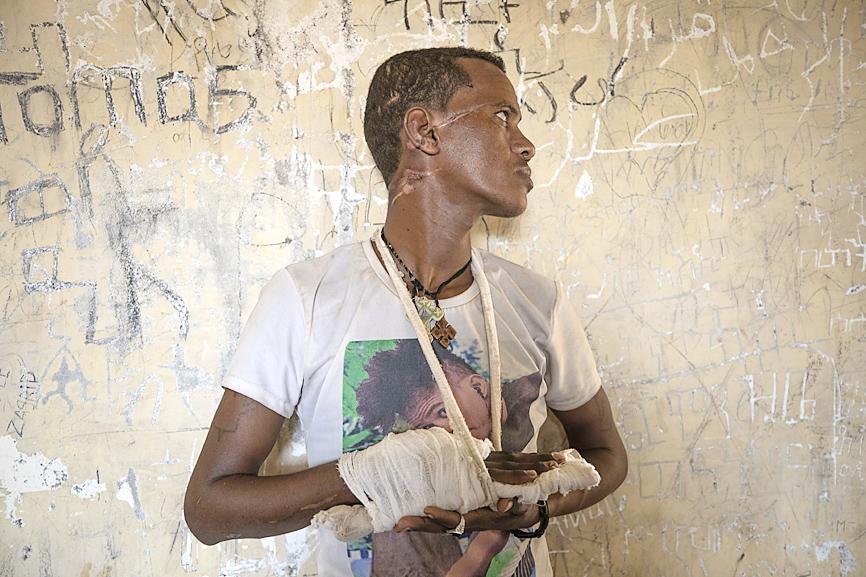The first shells landed before dawn, crashing through tin-roofed mud homes and sending Jano Admasi’s neighbors fleeing for cacti-dotted hills around her village in Ethiopia’s northern Tigray region.
Jano, a soft-spoken woman in her 60s, tried to escape as well, running with her eldest son, 46-year-old Miskana, along a dirt road leading out of the village.
However, on the way, she said, they encountered Ethiopian government soldiers who turned them around, forcing them into a nearby house with two other terrified families.

Photo: Reuters
What happened next — described by three eyewitnesses, but denied by the Ethiopian government — casts doubt on Ethiopian Prime Minister Abiy Ahmed’s claim that his military offensive in Tigray has been prosecuted with special care for civilian lives.
In an apparent rage, the soldiers accused Miskana and two other men in the group of aiding the Tigray People’s Liberation Front (TPLF), whose leaders are the target of military operations ordered last month.
“They asked us who we were, and we said we are just farmers and elderly women,” Jano said. “They came back again and said: ‘Get out,’ and separated the men from the women.”

Photo: AP
The soldiers made the men, including Miskana, sit down and, before Jano fully realized what was happening, shot them dead with Kalashnikov rifles.
A 15-year-old boy who leaped in front of a bullet in a futile bid to save his father was also killed.
The killings — which took place on Nov. 14, 10 days after Abiy announced the offensive — represent just one incident of civilian suffering in Bisober, a farming village home to about 2,000 people in southern Tigray.
In the three days that it took federal forces to wrest control of the village from the TPLF, 27 civilians died, local officials and residents said: 21 from shelling and six in extrajudicial killings.
The government has tightly restricted access to the region, making it difficult to assess the toll of a conflict that the UN has said is “spiraling out of control.”
However, exclusive access was recently obtained to southern Tigray, where residents of multiple towns and villages accused both government and pro-TPLF combatants of, at best, putting civilians in harm’s way — and, at worst, targeting them.
Survivors said that they dreaded how many civilians could have died across Tigray.
“If in just this one area, you have this much destruction, then imagine what might have happened generally,” Bisober resident Getachew Abera said.
The military did not respond to a request for comment.
Zadig Abraha, the Ethiopian minister in charge of democratization, said that any claims that Ethiopian soldiers killed civilians were “false.”
In retrospect, Bisober residents said that the first sign of the conflict came seven months ago when members of the Tigray Special Forces took over the village’s elementary school, which had been emptied because of the COVID-19 pandemic.
By early last month, when the first shots were fired, about 250 pro-TPLF troops were encamped there, digging trenches behind classrooms and storing weapons in what was once the principal’s office.
The Tigrayan fighters’ decision to base themselves in the center of Bisober helps explain the carnage that ensued, Bisober Administrator Getachew Nega said.
“The TPLF lost hope, and they came and put heavy weapons and other weapons in this village. They shouldn’t have done this,” Nega said.
Tigrayan combatants broke into abandoned homes from which they fired on Ethiopian soldiers, inviting massive damage, witnesses said.
Across Bisober, shelling from both sides tore open the walls of concrete homes and destroyed mud homes altogether, leaving only metal roofs behind.
“The conflict was a sudden act. Both parties had their missions, and we were caught in between,” said Said Idriss, a member of a command post trying to restore order in the area. “They could have asked the people to leave earlier.”
Today Bisober is relatively calm, with many residents laboring in nearby sorghum fields, trying to salvage this year’s harvest.
However, Jano cannot shake the memory of watching soldiers shoot her son in front of her, and of waiting in the street with his body for two full days, unsure what to do.
“We didn’t cry. We were too terrified. We were trembling with fear,” she said.
She said that she is focused on trying to rebuild her life and care for Miskana’s three children.
“I already lost my son and he’s not coming back,” she said. “It’s like spilt water, you cannot get it back.”

Packed crowds in India celebrating their cricket team’s victory ended in a deadly stampede on Wednesday, with 11 mainly young fans crushed to death, the local state’s chief minister said. Joyous cricket fans had come out to celebrate and welcome home their heroes, Royal Challengers Bengaluru, after they beat Punjab Kings in a roller-coaster Indian Premier League (IPL) cricket final on Tuesday night. However, the euphoria of the vast crowds in the southern tech city of Bengaluru ended in disaster, with Indian Prime Minister Narendra calling it “absolutely heartrending.” Karnataka Chief Minister Siddaramaiah said most of the deceased are young, with 11 dead

By 2027, Denmark would relocate its foreign convicts to a prison in Kosovo under a 200-million-euro (US$228.6 million) agreement that has raised concerns among non-governmental organizations (NGOs) and residents, but which could serve as a model for the rest of the EU. The agreement, reached in 2022 and ratified by Kosovar lawmakers last year, provides for the reception of up to 300 foreign prisoners sentenced in Denmark. They must not have been convicted of terrorism or war crimes, or have a mental condition or terminal disease. Once their sentence is completed in Kosovan, they would be deported to their home country. In

Brazil, the world’s largest Roman Catholic country, saw its Catholic population decline further in 2022, while evangelical Christians and those with no religion continued to rise, census data released on Friday by the Brazilian Institute of Geography and Statistics (IBGE) showed. The census indicated that Brazil had 100.2 million Roman Catholics in 2022, accounting for 56.7 percent of the population, down from 65.1 percent or 105.4 million recorded in the 2010 census. Meanwhile, the share of evangelical Christians rose to 26.9 percent last year, up from 21.6 percent in 2010, adding 12 million followers to reach 47.4 million — the highest figure

LOST CONTACT: The mission carried payloads from Japan, the US and Taiwan’s National Central University, including a deep space radiation probe, ispace said Japanese company ispace said its uncrewed moon lander likely crashed onto the moon’s surface during its lunar touchdown attempt yesterday, marking another failure two years after its unsuccessful inaugural mission. Tokyo-based ispace had hoped to join US firms Intuitive Machines and Firefly Aerospace as companies that have accomplished commercial landings amid a global race for the moon, which includes state-run missions from China and India. A successful mission would have made ispace the first company outside the US to achieve a moon landing. Resilience, ispace’s second lunar lander, could not decelerate fast enough as it approached the moon, and the company has